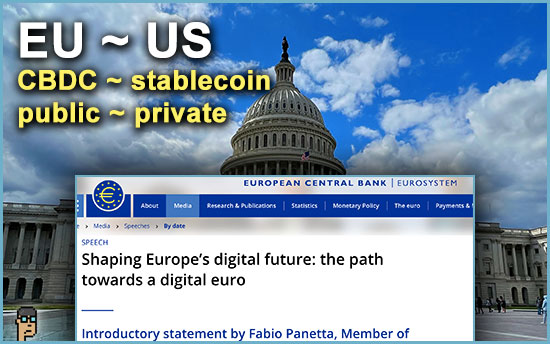EU’s big CBDC plans
In a speech yesterday titled “Shaping Europe’s digital future: the path towards a digital euro” and delivered to a committee of the European Parliament, European Central Bank (ECB) executive board member Fabio Panetta made the ECB’s case in support of the next phase of the digital euro – i.e. a European Central Bank Digital Currency (CBDC) – currently under Parliament’s consideration.
Panetta, who will become Italy’s central bank governor on November 1, said the ECB believes new private stablecoin efforts, including PayPal’s PYUSD, are “threats” to plans for the digital euro: “Private providers of payment services, including PayPal, have no incentive to limit the take-up of their stablecoins or the range of services they provide. Quite the opposite: their objective is to expand their customer base and gain market share.”
Turning to other “hot button” concerns, such as privacy and a CBDC, Panetta said “…the issuance of a digital euro represents an opportunity, not a risk, for the European financial sector. We are designing it as a safe payment tool in order to preserve the role of public money – that is, money backed by the state – while balancing innovation in payments with the stability of the financial sector and guaranteeing privacy.”
Interestingly, Panetta also mentioned how the digital euro (The EU’s CBDC) will not only co-exist with cash but have the ability to be used offline.
And then he concluded saying a digital euro “will strengthen our autonomy and resilience by relying on a European infrastructure and reducing our dependence on a handful of non-European providers.” Or, put another way, no need for the U.S. dollar.
Similar to the United States, nothing will happen on the digital euro front unless Europe’s legislative body (Parliament) approves a CBDC, which still seems a couple of years away at best.
Read the speech by the European Central Bank’s Fabio Panetta.
UK use case – tokenization
According to the Financial Times yesterday, The London Stock Exchange Group (LSEG) is moving into the world of tokenization and blockchain technology in spite of the crypto. The company says that the technology has reached an ‘inflection point’ and it’s time to get rolling. Julia Hoggett, head of the London Stock Exchange, an LSEG subsidiary, will drive the project.
Murray Roos, head of capital markets at LSEG says the goal is to become “the first large global stock exchange to offer an ‘end to end’ blockchain-powered ecosystem to investors,” according to the FT. Read more.
A very simple cross-border tokenization use case is provided in the article related to trading. Nevertheless, there is a sense in the market of the inevitability of blockchain’s importance to future business.
more tips:
“London Stock Exchange boss Julia Hoggett: We’ll fight for everything” – City A.M.
When ETF?
With certain members of Congress – such as House Financial Services Chair Patrick McHenry (R, NC) – keeping a watchful eye on the Exchange-Traded Fund approval process for Bitcoin at the Securities and Exchange Commission (SEC), The Wall Street Journal is keeping tabs on the next important ETF deadline. “With all of the major spot bitcoin ETF applications now delayed, the next date to watch is Oct. 16, the SEC’s next deadline to respond to an application. The SEC can delay a decision again at that date if it chooses,” said the WSJ on Friday. Read a bit more.
more tips:
Grayscale’s Legal Win Versus SEC Makes Spot Bitcoin ETF Approval More Likely: JPMorgan – CoinDesk
still more tips
Crypto funding in August wasn’t as good as the numbers may lead you to believe – TechCrunch
Q&A With Silicon Valley Prosecutor Taking Aim at Crypto ‘Pig-Butchering’ Scams – The Wall Street Journal
Factbox: Scrutiny of iris-scanning crypto project Worldcoin grows – Reuters

